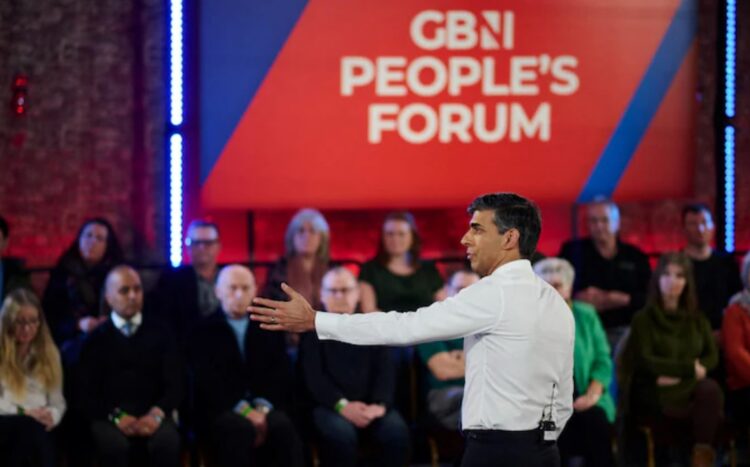There’s something deeply suspect about Ofcom’s latest swipe at GB News, writes Prof Andrew Tettenborn for Spiked.
Yesterday, the UK’s broadcast regulator found the upstart news channel in breach of impartiality rules for airing a show in which sceptical voters were given the chance to take the prime minister to task. Ofcom said that this breach was ‘so serious’ that it could lead to a ‘statutory sanction’ – that is, a big fine.
The BBC Question Time-style show, titled People’s Forum: The Prime Minister, aired on February 12th. Ofcom launched its investigation following complaints that the hour-long show failed to give appropriate weight to different points of view.
The audience members were selected by Survation, an independent market-research agency. They were made up of voters in County Durham who were undecided as to who to vote for at the next General Election. There was time for 15 questions. The vast majority of voters took the PM to task for failures of government policy.
Prof Tettenborn continues:
Over 500 people complained to Ofcom about the programme (no doubt many of them non-viewers with an axe to grind against GB News). Ofcom, incredibly, took these complaints seriously and has now ruled that the programme breached broadcasting rules. It has set out its reasoning in a 40-page ruling.
How, you might ask, could a show featuring independently selected, non-aligned voters directly quizzing an embattled PM breach impartiality rules? The Ofcom ruling makes no sense, at least if you look at it from the perspective of the average, level-headed man or woman in the street. But then, the apparatchiks who run Ofcom are neither particularly level-headed nor remotely reflective of the average voter.
According to Ofcom, there were three key problems with People’s Forum. First, no one on air expressed an official Labour Party view. Second, Sunak supposedly had it too easy. There should have been more answering back from the audience and challenges from the presenter, Ofcom says. Thirdly, the programme should not have aired when GB News was only in talks with Labour about a follow-up programme and had nothing firmed up.
These reasons are all nonsensical. The idea that a programme allowing ordinary people to question the PM is somehow rendered less impartial because nobody pushed an official Labour Party line is preposterous. Indeed, if this rule were applied to all opposition parties, such as the Greens or the Lib Dems, that would leave precious little time left to hear ordinary people’s concerns.
The complaint that the format of the show did not allow questioners to put follow-up questions to Sunak, and that the presenter did not intervene to put his own counter-arguments and criticisms to the PM, is even sillier. It betrays Ofcom’s low view of that County Durham audience – and indeed the GB News audience as a whole – as being incapable of judging Rishi Sunak’s answers for themselves.
As for the lack of a firm agreement for Keir Starmer’s participation, how can this be a fair criticism? If one party leader agrees to a hustings when the other doesn’t, you can hardly fault the broadcaster if it goes ahead with the leader who is game. Besides, the public will have plenty of other opportunities to hear Starmer’s pitch between now and the next election.
Ofcom simply does not trust viewers or voters to make up their own minds about politics.
Ultimately, this ruling reveals the snobbishness that lies at the heart of Ofcom’s decision-making. This has implications far beyond GB News. After all, thanks to the Online Safety Act, Ofcom has recently been empowered to supervise vast swathes of the internet. Under the Media Bill, which is currently making its way through parliament, it will soon gain powers to regulate streaming services and much more.
Worth reading in full.






